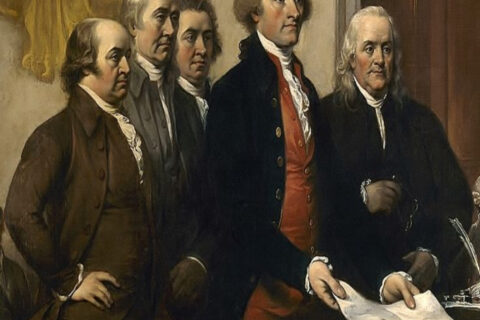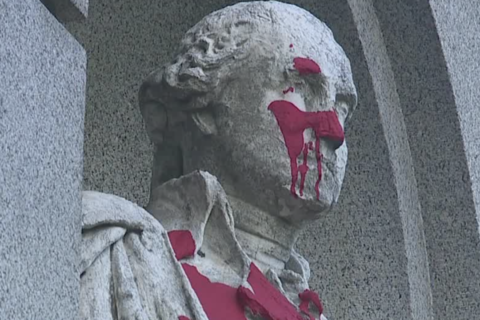On this 4th of July, I wish to examine some very important truths about this day, truths that public school and the media did not mention. While the 4th of July is usually considered an American holiday, it has special significance to Southerners. Anyone who has studied the history of the American Revolution is aware of the very important role played by Southern men. Virginia alone produced such military and political leaders as George Washington, Thomas Jefferson, Patrick Henry, James Madison, James Monroe, Richard Henry Lee, George Mason, Henry Lee III (father of Robert E.), and George Rogers Clark. New England never could have broken free from Britain without the South.
The 4th of July is a celebration of the unified Declaration of Independence issued by the Continental Congress on behalf of all thirteen colonies. I worded it that way, because in accord with the rights and prerogatives of sovereign states, several colonies turned states had unilaterally declared their own independence from Britain before the joint declaration. My July 4 post The Meaning of the 4th of July from last year, written when I still entertained the “restore America as a free white republic” dream, dealt with the history of the day.
First I must point out that the American Revolution was not about the destruction of the concept of monarchy, at least not initially. The whole issue of “taxation without representation” (and the clear logic that it could be expanded to any law being imposed without representation) was an objection to the tax laws passed by the Parliament of Great Britain. The Townsend Acts were just that, acts of Parliament. In July of 1775, shortly after the fighting at Lexington and Concord and then Bunker Hill and fully one year before the writing and adoption of the Declaration of Independence, the Continental Congress adopted the Olive Branch Petition. Though American forces were in the field, the Olive Branch Petition professed allegiance to King George, and that if the king would just reign in “Your Majesties ministers” that things could be peacefully patched up.
The American Revolution was about white men defending their ancestral rights guaranteed by a limited (not absolute) monarchy, not about the destruction of the concept of monarchy and all social hierarchy. After we legally separated in 1776, with no royal family existent and a clean slate, we decided to trade a king for an elected executive. It is that simple.

The Declaration of Independence was written by Thomas Jefferson. It showcased his great intellect, and hinted at the problems that enlightenment era egalitarianism would bring the American states. If “all men are created equal” and have “unalienable Rights” which include “Life, Liberty, and the pursuit of Happiness” –then we have a problem. If all men are covered here, what about the Negro men owned by the man who wrote those words? What about women and children? What Jefferson and the men who adopted the declaration in 1776 obviously meant by “all men” was that all *white* men were created politically equal, but they did not write it that way. They created a paradox that has dogged us to this day.
Taken in historical context, the words of the Declaration meant that free born white males had rights that were not to be abused, and which were to be handed down to their descendants. Taken out of context, the words of the Declaration can be twisted to support libertarianism and far left activism. Though historically ignorant Americans twist Jefferson’s words to support universal equality, the words were actually a product of a system based on a white male based hierarchy, a somewhat informal aristocracy system (to which Jefferson was born). Anyone who has read Jefferson’s statements concerning Negroes in Query 14 of his book Notes on the State of Virginia already understands that Jefferson did not think that all men were physically or politically equal.
Further, the words of the declaration did not give women the right to vote and hold political office, or change the social order of a woman keeping the house and caring for the children while the man supported her and benevolently ruled his house. It also did not set minor-aged children free from their parent’s authority. It is clear that Jefferson and the declaration were not advocating the creation of a race blind egalitarian society were Negroes, Indians, and liberated feminists could gather and sing Kum ba yah before taking their elected seats in the legislature!
While the Declaration mentions “Nature’s God”, “Supreme Judge of the world”, “divine Providence”, and a “Creator”, it never specifically mentions Jesus Christ or Christianity. This is perhaps another sign of Jefferson sliding toward enlightenment theories instead of long standing social structures and traditions based on the Bible and centuries of the history of his people.
But there is more than just the application of certain phrases about equality. In a sense, the clear and eloquent arguments made by Jefferson for separation from Great Britain and its monarch laid a solid foundation for the Southern States to separate in 1861. Most people will not think of that this 4th of July. The Southern nation, like the American colonies eighty five years earlier, thought it necessary to “dissolve the political bands” that bound them to a corrupted union, and simply sought “to assume among the powers of the earth, the separate and equal station to which the Laws of Nature and of Nature’s God entitle them”.
Further, the declaration was titled “The unanimous Declaration of the thirteen united States of America”. Not the United States of America, but the united States of America. While engaged in military alliance and joint congress against a common foe (Britain), the colonies were not formally united into a confederacy until the Articles of Confederation were ratified in 1781. Thus, the Declaration of Independence did not create the U.S.A.
The Declaration of Independence was not about a holy crusade against the concept of monarchy, about universal equality of the races and sexes, or the creation of a confederacy that has since morphed into a continent wide empire.
At the basis of the break with Britain in 1776, and the secession of the South in 1861, is the concept of what a political society/country should be based upon. Any sane and stable country must be more than a “proposition” nation; it must have as its base a people-group with shared ethnic and cultural ties. The politics come after that. Simply believing a few key principles and uniting for liberty and wealth is not enough; such a society is based on nothing but self-gratification and lust, and will spectacularly disintegrate given enough time. We are, right now, likely in the final stages of that disintegration.
I certainly do respect the men of the American Revolution who bequeathed us our (now basically vanished) liberty. I will think about the boys of 76 today. I have ancestors who served in patriot militia units during the American Revolution. But I will not be saluting the American flag or setting off fireworks today, and neither would the Founders if they could see what the U.S.A. has become. Let us respect our ethnic heritage, including before America was even dreamed of, but let us not allow the memory of past political greatness to blind us to today’s problems and the political and racial crisis we now face.




I am so glad that we finally have an honest intellectual movement in this country that isn’t afraid to come full circle and admit the founding fathers were race realists. The last 60-70 years of “conservative” thought has swept it under the rug to make way for globalism and universal equality. The SJW leftists have done us a favor by attacking the racial beliefs of the founding fathers. We can now get to the truth of our founding documents and not attempt to rewrite history for “muh feels” and “muh ideals”. We can finally lay it to rest and move forward with ideas that are workable, like Balkanized racially homogenous nations peaceably existing and cooperating in a TRULY diverse world.
A very well written article, full of well clear, yet nuancet positions, the pith of which is this…
‘The American Revolution was about white men defending their ancestral rights…’
Now, the only dilemma with this is that most White men no longer consider themselves as White, or at least, not so much as they regard themselves members of a race-denying anti-White corporation which exploits them every day, and which conditions them to be proud of their support for that.
There are signs, however, that young White Men are beginning to break the manacles of masochism, and you are one of those men.
Great post at the lamecherryblog about a Southern General.
Wish he were alive today